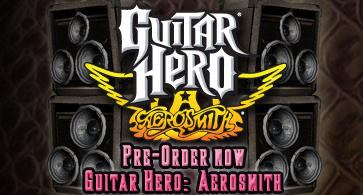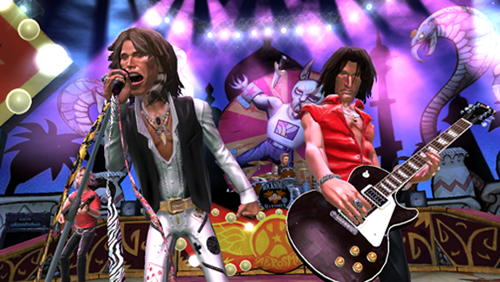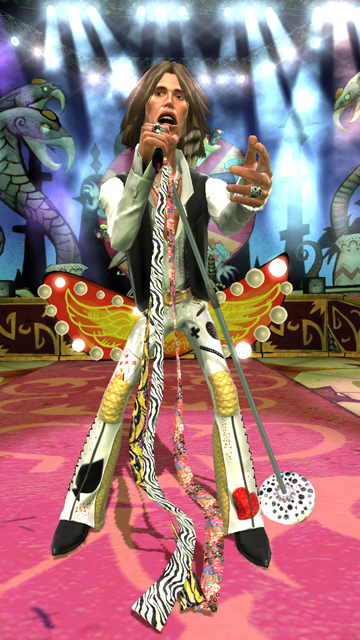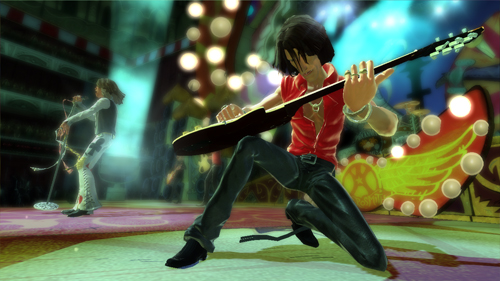

By Mike Snider, USA TODAY

Two years ago, Aerosmith guitarist Joe Perry came home and found his youngest son, Roman, now 16, playing Guitar Hero with friends. "I played it a little bit and said, 'This is fantastic. Does it have any Aerosmith songs on it?' " Perry says. "The first game didn't, and I was hugely (upset)."
Perry may have been playing the blues then, but no more. The first one-band edition of the game, Guitar Hero: Aerosmith, is due in June for PlayStation 2 and 3, Xbox 360 and Wii. GH: Aerosmith (about $50) will track the history of the Rock and Roll Hall of Famers, who have sold 100 million-plus albums.
"It's got our whole career, from the first place we ever played as a band, Nipmuc High School (in 1970, about 40 miles from Boston) to the (2001) Super Bowl halftime show," says lead singer Steven Tyler. "It's 30 years of the legend of Aerosmith and where we played to get where we are."
GH: Aerosmith is based on the technology of Guitar Hero III: Legends of Rock, which has sold 6 million copies in its first four months. The $820 million in Guitar Hero sales for 2007 set a U.S. industry record. The GH franchise has sold more than 15.6 million copies worldwide of the games that let you strum and hit note buttons on a guitar-shaped controller as tracks play on-screen.
Aerosmith can be played by one or two players, who start out as Perry and can unlock guitarist Brad Whitford and bass player Tom Hamilton. The entire band did motion-capture sessions so screen images would be realistic. (Beyond Aerosmith, some opening acts will appear in the game, as well as some special guests — think Run-D.M.C.)
"It's a cartoon, but it's got all my movements and Steven's movements," Perry says. "You can tell it's Joey (Kramer) playing the drums."
Aerosmith members took their motion-capture sessions seriously, says Chris Parise, the senior producer on the game for developer Neversoft. "People get a feel for what going to an actual Aerosmith concert is really like," he says. "It is pretty authentic."
Aerosmith seemed destined to connect with Neversoft. As the game developer was fine-tuning Guitar Hero III, company president Joel Jewett was listening to the cover version of Aerosmith's Same Old Song and Dance and said the cover singer "didn't sound like Steven Tyler," said the game's lead designer, Alan Flores. "So we went back to get the original master, and in one day Joe Perry found out about it and was super-excited. He got the masters, and that sort of established the relationship."
About the same time, the game's development team began researching ways to expand the hit franchise. It surveyed Guitar Hero buyers and non-gamers, too, about which musical artists they liked and which ones might they be interested in playing a game about. "Aerosmith was consistently one of the top selected bands not only by (Guitar Hero) owners but also by the mass audience that is not an owner," says Dusty Welch of the game's publisher, RedOctane. Welch spent eight years at Activision before it acquired RedOctane in 2006.
The band had the headliner qualities they were looking for, Welch says: a respected lead guitarist, a charismatic frontman and a multiplatinum, globally appealing playlist.
"Aerosmith has demonstrated this resiliency and relevance that spans many decades," he says.
Aerosmith, which also has a new album in the works, hopes to benefit from the effect Guitar Hero has on music sales. Every Guitar Hero III song tracked by Nielsen SoundScan (62 of 70) saw an increase in digital download sales the week ending Dec. 30, when many who got the game as a gift were playing it.
Downloads of relative newcomer DragonForce's Through the Fire and Flames, selling fewer than 2,000 weekly, rose to more than 10,000 after GH III's release and approached 40,000 the week ending Dec. 30. Aerosmith earned a more modest increase on its Same Old Song and Dance, which rose to 2,041 from 374 copies the previous week.
To boost online sales, iTunes has a Guitar Hero store with collections from the original artists and WaveGroup, the music studio that created the many cover tracks used in the games. (iTunes also has a section devoted to songs in the similar game Rock Band).
Also out: an 11-track Guitar Hero III soundtrack CD.
Video games, Perry says, will "be one of the ways people are going to get their music. Guitar Hero works on so many levels. It break down a lot of barriers."
To promote GH: Aerosmith, the band's first single, 1973's Dream On, will be available for GH III players to download for free via Xbox Live and PlayStation Network. Some day, the band could release new music through the game, Perry says: "It would make sense."
Eventually selling music tracks online, Welch says, "is part of the next evolution."

Q&A: Steven Tyler and Joe Perry
Aerosmith's Steven Tyler and Joe Perry talked to USA TODAY's Mike Snider about the plans for their new Guitar Hero: Aerosmith game. Here's extended excerpts from their con-versations:
Q: What do you think about Aerosmith having its own video game?
Steven Tyler: There are some battles you can't fight. You would like to keep it traditional and make it just deep, deep tracks from albums or B-sides. But technology is going so fast right now rather than be left behind, you are going with the flow.
It's a different day and age. Twenty-five years ago we would never have let one of our songs (Dream On ) be one of those used in selling cars (in a 2004 Buick commercial). But now, like with I Don't Want to Miss A Thing (in 1998's blockbuster film Armageddon), it's placement.
When I heard about Activision and all this. I thought whatever I can do for this to make it as good as it can be — because my son plays it — I thought I should do it.
Q: You're talking about the motion capture session for the game?
Tyler: I went to Los Angeles to see how you do this. And they said somebody can mouth your lyrics and I said, 'I didn't spend 30 years being me to let someone else do that.' We spent four weeks with the guys at Activision and Neversoft. It was like what I did for the (2004) movie The Polar Express (Tyler played an elf). You have all these (sensors) on you and they are synched up with a computer, but we kind of took it five steps farther. I said, 'What if we move the cameras out and set up a field in the middle and I grab the mike stand and do my thing with the mike so more of me can be captured.' On the third week, they showed me what I'd done and I just couldn't believe it.
Q: How do musicians see the video game industry, particularly with games like Guitar Hero?
Tyler: I think there are so many kids playing video games now, it's kind of like a sound-track to a movie. It takes a song and enhances it. That attached with a good moment in a song can mean everything, like a live appearance where Joe runs to the end of the ramp and takes his shirt off and smashes his guitar. I had my doubts, but it's really insane. I was able to do things you would never see live. And if you win, we did some special things like interviews and told some secrets like what was I thinking of when I wrote the songs.
In the old days we thought it was cheesy to attach a song to selling something, but this isn't like selling a product. You are playing the game and the room is full of your friends.

Q: Can you tell me how this video game came about?
Joe Perry: I walked through the den where we have the video games usually set up and I noticed the controller had an oddly familiar shape and I heard some rockin' music and I said, 'What's going on? What is this?' (His youngest son) Roman explained it to me and I played it a little bit and said, 'This is fantastic. Do they have any Aerosmith songs on it?' And the first game didn't. …I called my manager and said, 'This is fantastic. How come we're not involved in this?' And ever since then, I've been pushing to be as involved in the game and the movement as well.
Q: The movement? What do you mean by that?
Perry: I think it is part of how people are going to get music. The record companies have eaten themselves, basically dissolved and are trying really hard to figure out how to resur-rect a dying paradigm. And it's right in front of them. This is one of the ways (for people to put out new music). Everything from car commercials … to YouTube and an aborted Nap-ster that should have been snapped up by the record companies a long time ago. It was obvious that the fans wanted it and they didn't mind paying for it but the record companies just turned a blind eye to it and basically destroyed an industry.
So what is left is a huge gap. On one side you have fans who want music and great ways to hear it, MP3 players and iPods and earphones and satellite radio, so they have all these ways to listen to music and you have a bunch of great artists and budding (and) and new artists releasing some really good music and somewhere in the middle is this gap in how are they going to get it. That the artists get paid what they should get paid and not ripped off and (consumers) not paying $20 for a CD they should only be paying $7 for.
Video games are a great vehicle for bands to put new music out. … It's happening and it's going to be one of the ways people are going to get their music. A game like Guitar Hero is really good because you get to play along with it. It's not just background music.
Q: I'm 45 and Guitar Hero reconnects me to songs I listened to when I was younger.
Perry: It works on so many levels because it break down a lot of barriers. Kids are hear-ing songs we may consider 'unhip'. There was an era when there was a hipness factor to why people listened to certain songs. That gets broken down because the popularity of the song is based on it's a good song. Bottom line that's it. … That's the movement I'm talking about.
It's been great working with guys of this younger generation who are gamers and love music and hard rock and all kinds of music and they have figured out a way to give fans a chance to step one step closer to the experience of being in a rock band.
Q: Some musicians have kind of made fun of the game. But it sounds like you think it's a legitimate way for fans to have a deeper experience with music.
Perry: Right. I strongly believe that out of 100 people who play the game there is going to be a certain percentage that will say, 'Wow, this is fun, I wonder what it feels like to play a real guitar' and get a real one and an amp and see what it's like. It may be a small percent-age but nonetheless, it's another encouragement for kids to pick up and play some real music. So I think it has got a lot of benefits to it.
Q: Might you release some new music through the video game?
Perry: It has been talked about. I'm not sure exactly just where that stands. It would make sense from a fan's point of view, from a band's point of view, from a record com-pany's point of view. But I don't know from a lawyer's point of view.
All I can say is that's the opportunity, a part of the movement and seeing how it's going to go. One of things about being on Sony, it works two ways. It's great to be on the label, but on other hand you are restricted to a lot of things. Without a good deal of haggling between lawyers, I don't know if it is a possibility at this moment.
But definitely for young bands that don't have any restrictions, I think it's happening. It's great because right next to (new bands' songs) you hear songs off of (Cream's) Disraeali Gears or The Jimi Hendrix Experience's Are You Experienced and it's a great vehicle to hear all kinds of music. Most of the time I know I listen to music on the radio when I am driving and that's about it. It's background music most of the time. Or I'm actually writing it or playing it. The point is I don't always sit down and just listen to stereo. But with this game, it's part of the entertainment. You are listening to the music and you are learning the music and you are getting inside the guitar riffs. From that point of view, I think it's pretty in-credible, you know.
Q: How did you arrive at the storyline?
Perry: Once we decided it was something we could work together on, we were trying to come up with something that made sense as a storyline and the idea. Since we have such a big catalog — it was kind of important that if you were going to have a game built around one band you need one that has a lot of songs, the game has like 30 or 40 songs in it — the decision that finally settled out was Why not do it in a very rough chronological fashion so it kind of tells the story of what went on.
You can hear the difference in the songs as the band goes along and as we get a little more sophisticated in the studio. You can hear the growth of the band musically and entertainment-wise. One might say the story is almost like a cliché but we were one of the ones that where there doing it. Those ups and downs have been followed by so many other bands since our early days, it has become kind of cliché. Bu for us it was our life. To be able put it in this kind of context, in a very lose kind of tongue-in-cheek sometimes, sometimes serious, and, funny sometimes, it's another level of entertainment for the player.
Q: Will it even go into the times where some members of the left and the band quit playing for a while?
A: I'm not sure. I don't think so. It's focused pretty much on the positive. The storyline is pretty positive and exciting.
To Pre-Order YOUR copy of Guitar Hero: Aerosmith click HERE.





